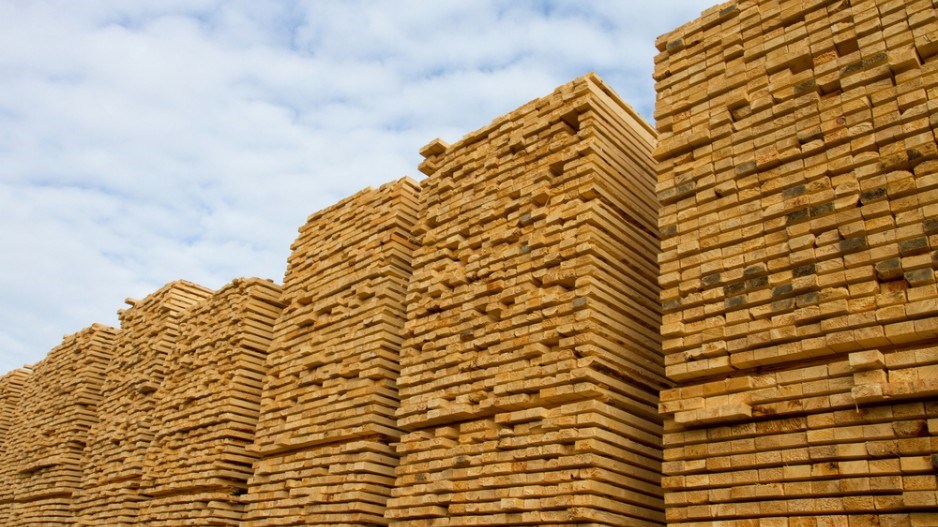Vancouver-based Interfor (TSX:IFP) has signed a US$94.7 million deal to purchase four sawmills from Tacoma-based Simpson Lumber Company in a move that gives Interfor an improved hedge against a renewed softwood lumber battle.
Company president Duncan Davies said December 19 that the primary reason behind the purchase of two Simpson mills in the southern United States and two in the Pacific Northwest is the opportunity to provide value to the company. The four mills are in close proximity to existing Interfor mills.
But he acknowledged that looming uncertainty over softwood trade with the U.S. is a background motive. The current softwood agreement expires in 10 months and the American lumber industry has indicated it is not interested in renewing it, raising the spectre of another softwood war.
“We view having capacity south of the border as a great hedge against events that we can’t control – whether it’s currency shifts or trade issues,” Davies said December 19 in a conference call with investment analysts.
“We see this as enhancing our ability to withstand anything that might come our way from a trade standpoint. But we are really driven to add capacity in areas where we think we can bring our expertise to bear and create value.”
Once the deal is finalized in the first quarter of 2015, Interfor will be the fourth-largest sawmill company in North America, with the capacity to produce 3.1 billion board feet of lumber a year. Sixty-seven per cent of its production will be in the U.S.
Investors liked the move, responding by pushing Interfor stock up $1.87 to $20.52 a share in mid-morning trading.
The U.S. housing market is the largest market of its kind in the world, Davies said during the call in explaining the strategy behind buying more mills in the U.S. Interfor already has nine mills south of the border. It has five mills in B.C.
Davies also pointed out that the purchase agreement includes a possible British Columbia angle: one of the four mills – Simpson’s Commencement Bay mill at Tacoma – is on tidewater.
That attribute, he said “gives us the ability potentially to move fibre from the coast of B.C. directly into that Commencement Bay facility, which is a pretty attractive upside potential for us.”
The deal with Simpson was structured in such a way to take into account the potential to use B.C. wood at Commencement Bay. It’s really two deals, Davies said. Interfor paid US$94.7 million for the three mills located in Meldrim, Georgia; Georgetown, South Carolina; and Longview, Washington. The Commencement Bay purchase is structured around future payments that are tied to the mill’s financial performance. If Interfor is able to improve the performance of the money-losing mill, it will make annual payments to Simpson equal to half of the earnings before interest, taxes, depreciation and amortization (EBITDA) for three years and then one final payment of 2.5 times the average annual EBITDA.
Paul Quinn of RBC Capital Markets said it is too early to tell if the Commencement Bay mill can be turned around. But the way the deal is structured, he said, Interfor is basically buying three mills for US$94.7 million and getting Commencement Bay as a spare in case the turnaround is not successful.
Scott Lunny of the United Steelworkers Union said any deal that includes exporting B.C. logs to a U.S. mill is likely to create controversy on this side of the border.
“Certainly we are not going to be supporting that kind of position,” he said.
The purpose of Crown timber tenures is to create employment within B.C., Lunny said.
Davies told analysts that Interfor structured the Simpson deal to take into account the uncertainty attached to the Commencement Bay mill.
“If it works out the way we expect it to work out, we see potential upside for both us and the Simpson shareholders,” he said. “If it doesn’t work out the way we expect it to work out, we have built in an insurance policy that protects us,” he said, referring to the agreement that fixes the mill price to future performance.
Some B.C. sawmills are already struggling to get enough logs, said Keta Kosman, publisher of Madison’s Lumber Reporter, but she said the Canadian and American lumber industries are already so intertwined that the two industries should be working closer together rather than fighting over issues like softwood duties.




